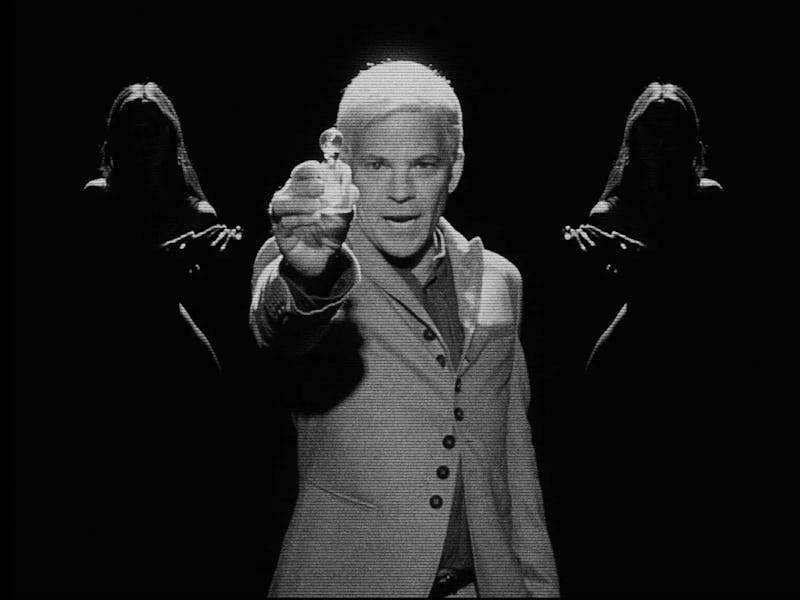Divinity Is the Coolest-Looking Sci-Fi Movie to Say Absolutely Nothing
Eraserhead meets Frankenstein by way of a perfume ad.

In the world of B movies, Ed Wood is the grandfather, Tommy Wiseau the king, and Neil Breen the crown prince. Breen, a Californian architect, has self-produced, written, directed, and starred in six feature films, all featuring him wandering around the Californian desert musing about how he could fix the world and defeat all those corrupt people in power. That’s about as specific as it gets.
His work is memorable, but it’s hard not to wonder what would happen if he had a bigger budget, clearer artistic vision, and smaller ego. Thankfully, that’s no longer a mystery. The answer is clearly Eddie Alcazar’s Divinity, a black-and-white sci-fi fever dream that has some intriguing things to say, but drowns them out with social commentary that makes Black Mirror seem subtle and nuanced.
The desert is practically another character in Divinity.
Alcazar, aided by Steven Soderbergh as executive producer, tells the story of a futuristic world where Jaxxon Pierce (Stephen Dorff) reckons with the invention of “Divinity,” a youth serum that promises eternal life. (In the future, even the leaders in tech have cringey zoomer names like Jaxxon.) Any attempt at a plot description won’t do this movie justice, though. There are prolonged sex scenes, parodies of TV commercials that echo ‘90s art school students, and inexplicable non-sequiturs throughout, with the film jumping from locale to locale and conceit to conceit like a toddler with a remote control. The intentionally poor structure, if you could even call it that, is no surprise when you learn Alcazar never wrote a script and would work off drawings and sketches.
Instead, we zoom through the desert in black and white, and when we’re not there, we’re in inscrutable voids. Dialogue comes from nowhere and everywhere, and the subject matter morphs from youth to fertility to death with no warning.
There’s something admirable about Alcazar’s ambition: he doesn’t conform to his audience nor does he pander to them. The cinematography is confusing but beautiful, and it’s hard to look away in even the most puzzling moments. It’s the kind of movie that would be projected on the wall at the coolest nightclub where the meanest kids in town go.
Moises Arias in Divinity.
This kind of work is catnip for actors looking to set themselves apart, and Divinity is just further proof. Stephen Dorff devours the scenery as Jaxxon, and Scott Bakula is a surprising delight as Jaxxon’s father Sterling in flashbacks. There are not one but two Disney Channel stars featured: Bella Thorne as quasi-Bene-Gesserit Zima, and Hannah Montana’s Moises Arias as one of the closest things this movie has to a protagonist.
This is not a movie you watch for the plot, just the vibes. That isn’t an insult; some of the best movies out there coast on nothing but cool aesthetics. There’s interesting framing, blocking, and even an admirably low-rent stop-motion sequence that brings back Harryhausen in the best way possible. Yet, it still overstays its welcome and, by the end, the randomness of the film’s flipping between scenes starts to grow old, even though nobody in the movie does.
Science fiction is the genre of looking forward or speculating on what’s next. Maybe this is what is next for sci-fi cinema: a no-holds-barred cerebral surreal experiment that will keep moving before a Tik Tok-addled generation will look away. For now, this experimental movie will be a great time for the sliver of the audience who can look through the superficial layers to mine some kind of deeper meaning. But any story that Divinity is trying to communicate is only buried beneath the film’s splashy stylings.